Trayvon Martin
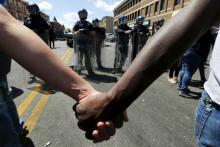
Douglas, author of the new book Stand Your Ground: Black Bodies and the Justice of God, writes about the death of Florida teen Trayvon Martin, the acquittal of George Zimmerman in his killing, and the deaths of other unarmed black people that followed.
Douglas talked about violence faced by African-Americans and the black church’s response. The interview was edited for length and clarity.

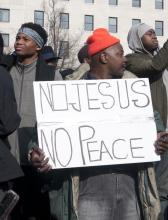
“Excuse my ignorance, I thought I was a free black man.”
“I’m 11 [years old], I matter.”
“You can choose to look away, but never again can you say you didn’t know.”
“How many times do we have to protest the same [s**t]?”
“White silence is white violence.”
“We have nothing to lose but our chains.”
These signs, and many others, lined the horizon of Pennsylvania Avenue on Saturday in Washington, D.C. In a ‘Justice for All’ march organized by Al Sharpton and the National Action Network, thousands of protesters gathered to protest police actions that have resulted in the deaths of unarmed young black men across the United States.
After marching from Freedom Plaza to the U.S. Capitol, protesters listened to speakers from national racial justice organizations address some of these most recent acts of police brutality.
Al Sharpton sought to draw attention to the diversity present on the streets.
“This is not a black march or a white march. This is an American march for American rights,” he said.
Indeed, the black community was not alone in speaking up against police brutality. One Latina activist encouraged her Latino brothers and sisters to “voice their pain” from police harassment and “come forth and unify with the African American community so we can be strong together.”
“¡Ya Basta!” she concluded. [“Enough is enough!”]
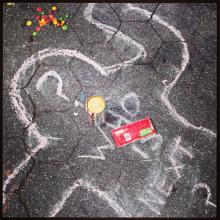
The stories of young black men being killed by white police are sparking a national conversation. However, public responses to these painful stories reveal an alarming racial divide. From an unarmed teenager killed in Ferguson, Mo.; to a 12 year-old boy shot dead in Cleveland; to a white police officer on video choking a black man to death in New York City; and a startling series of similar stories from across the country and over many decades — our reactions show great differences in white and black perspectives.
Many white Americans tend to see this problem as unfortunate incidents based on individual circumstances. Black Americans see a system in which their black lives matter less than white lives. That is a fundamental difference of experience between white and black Americans, between black and white parents, even between white and black Christians. The question is: Are we white people going to listen or not?
White Americans talk about how hard and dangerous police work is — that most cops are good and are to be trusted. Black Americans agree that police work is dangerously hard, but also have experienced systemic police abuse of their families. All black people, especially black men, have their own stories. Since there are so many stories, are these really just isolated incidents? We literally have two criminal justice systems in America — one for whites and one for blacks.
Are there police uses of force that are understandable and justifiable? Of course there are. If our society wasn’t steeped in a gun culture, many of these shootings could be avoided. But has excessive, unnecessary, lethal force been used over and over again, all across the country, with white police killing unarmed black civilians? Yes it has, and the evidence is overwhelming. But will we white people listen to it?


Our nation has a problem. It is not a “black” problem or a “white” problem, but a “human” problem that we all succumb to — and have the power to change. Our beloved nation was NOT “conceived in liberty” OR “dedicated to the proposition that all men are created equal,” despite President Lincoln’s well-intentioned words. That was the hope, but it has never been the reality.
Many of my African-American sisters and brothers are furious. Yet another child has been felled. The challenge is this — if a tree falls in the forest and white folks don’t hear it, does it make a noise? Many of us who are white do not have the contextual experience or the “ears to hear” to understand the fear and the fury.
More than a decade ago, I pastored in a community that was predominately African American. It grew from 72 percent to 98 percent black in just seven years as a result of “white flight.” In the course of this time, the police force struggled because it didn’t listen to the people. Most of the officers were white and could legally live up to 30 miles away; as a result many (including the chief) lived in another state.
At one heated meeting, the police chief informed us what we “could” and “could not” do as we discussed community initiatives that included the older white and adolescent black residents in conversation and collaboration. Finally, as the pastor of one of the larger churches in town, I stood up and said, “Chief, please understand that we are not asking for your permission. We are telling you what we, as citizens of this town, are going to do. Now we need to know — are you with us? Or not?” The African-American residents stood and clapped loudly. I felt their pain and the reason for what some perceived as “paranoia,” but what I knew to be legitimate fury.
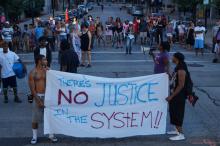
The problem is the systemic injustice inherent in Stand Your Ground laws: just feeling like you are being threatened can justify your response in “self-defense.” Under Florida self-defense laws now, someone can use even lethal force if they “reasonably believe” it is necessary to defend their lives or avoid great harm. How does a jury decide what a “reasonable person” would do under all the circumstances? Even if Dunn really believed there was a gun in the black teenagers’ car and there wasn’t one, he could still be justified in shooting into the car according to Stand Your Ground. The New York Times quoted Mary Anne Franks, an associate law professor at the University of Miami saying, “This trial is indicative of how much of a problem Stand Your Ground laws really do create … By the time you have an incident like this and ask a jury to look at the facts, it’s difficult to re-create the situation and determine the reasonableness of a defendant’s fear.” And unfortunately, the law creates an opportunity for racial factors — whether they’re conscious or not — to trump facts when even one juror who is sympathetic to a defendant’s “reasonable” fear can prevent prosecution.

I stepped off the elevator and was greeted by three men with hoodies in church yesterday. My shoulders tensed for a few moments. Growing up in New York City, I’ve been groomed in paranoia and 20/20 peripheral eyesight. Yet after taking a second look, I smiled as I admired the theater props: Three hooded figures containing the faces of Hillary Clinton, Jay Z, and Trayvon Martin, with a caption reading, “We are Trayvon Martin.”
Metro Hope Church meets weekly at Harlem’s National Black Theater, so our church gatherings can often be a dance in improvisation as we’re frequently welcomed by new sets. One summer we were greeted by a gigantic “tree” protruding from center stage. It made this preacher’s imagination run vivid with all sorts of sermon possibilities.
But the hooded figures that greeted me last Sunday were a tribute to Trayvon Martin called, Facing our Truth: 10 Minute Plays on Race and Privilege. This month also happens to be the month that Trayvon Martin was born, and a month for celebration of Black History. These convergences do not escape me, nor does the distinct mission of our church in Harlem.
No stranger to dialogue on race and privilege, our church will often reflect on Dr. King who once lamented, “We must face the fact that in America, the church is still the most segregated major institution in America … 11:00 on Sunday morning …we stand at the most segregated hour in this nation.”

Sojo editors looked back at the blogs of 2013 and found that these were the 10 most widely read Sojourner blog articles of the past year.
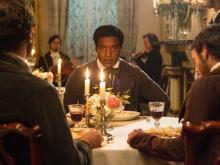
The most controversial sentence I ever wrote, considering the response to it, was not about abortion, marriage equality, the wars in Vietnam or Iraq, elections, or anything to do with national or church politics. It was a statement about the founding of the United States of America. Here’s the sentence:
"The United States of America was established as a white society, founded upon the near genocide of another race and then the enslavement of yet another."
The comments were overwhelming, with many calling the statement outrageous and some calling it courageous. But it was neither. The sentence was simply a historical statement of the facts. It was the first sentence of a Sojourners magazine cover article, published 26 years ago titled “America’s Original Sin: The Legacy of White Racism.”
An extraordinary new film called 12 Years a Slave has just come out, and Sojourners hosted the premiere for the faith community on Oct. 9 in Washington, D.C. Rev. Otis Moss III was on the panel afterward that reflected on the film. Dr. Moss is not only a dynamic pastor and preacher in Chicago, but he is also a teacher of cinematography who put this compelling story about Solomon Northup — a freeman from New York, who was kidnapped and sold into slavery — into the historical context of all the American films ever done on slavery. 12 Years is the most accurate and best produced drama of slavery ever done, says Moss.
In her New York Times review, “ The Blood and Tears, Not the Magnolias,” Manohla Dargis says, 12 Years a Slave “isn’t the first movie about slavery in the United States — but it may be the one that finally makes it impossible for American cinema to continue to sell the ugly lies it’s been hawking for more than a century.” Instead of the Hollywood portrayal of beautiful plantations, benevolent masters, and simple happy slaves, it shows the utterly brutal violence of a systematic attempt to dehumanize an entire race of people — for economic greed. It reveals how morally outrageous the slave system was, and it is very hard to watch.

This year marks the 150th anniversary of both the issuing of Emancipation Proclamation and the battle of Gettysburg. This month marks the 50th anniversary of the historic March on Washington and Dr. Martin Luther King, Jr.’s “I Have a Dream” speech. All three moments marked major turning points in the fundamental American struggle to actualize the divine dream of life, liberty, and equality for all. That dream has been especially powerful through the struggle for African-American freedom.
From a biblical perspective, American slavery and Jim Crow segregation not only subjugated the body. For about 300 years, from Virginia’s first race-based slave laws in the 1660s to the passage of the Voting Rights Act in 1965, the legal binding of black hands, feet, and mouths also bound spirits and souls. Both slavery and Jim Crow laws denied the dignity of human beings made in the image of God and forbade them from obeying God’s command to exercise Genesis 1:28 “dominion” — in today’s terms, human agency.
So, the Emancipation Proclamation and passage of the 13th, 14th, and 15th Amendments were cause for jubilee worship in black churches and among other abolitionists. Likewise when the Civil Rights Act passed in 1964 and the Voting Rights Act passed in 1965, churches across the nation erupted again in worshipful jubilee.
Now, nearly 50 years after the second American jubilee, African Americans are being stripped of dignity and constitutionally protected freedoms like we have not seen since Jim Crow.
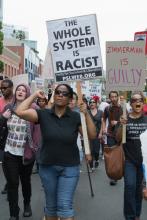
Several years ago, Michael Emerson and Christian Smith criticized the quick-fix approach to racism found in the evangelical race reconciliation movement. They noted that evangelicals tended to address systemic racism through promoting interracial interactions at one-time events such as Promise Keepers rallies. Ironically, this approach tended to increase rather than decrease racism because it gave white evangelicals just enough exposure to people of color to think they now understood race without enough systemic interaction to expose them to the endemic nature of racism. They suggested instead that the preferred response was to engage in political and legal advocacy in order to change the institutional nature of racism. However, what they failed to address in that book is that political and legal approaches to race often suffer from the same quick-fix approach.
Today, we see the same quick-fix dynamics in the outcome of the George Zimmerman trial. Some are focusing again on developing interracial interpersonal relationships, while other evangelical groups have focused on legal advocacy. But in our rush to promote a “solution,” we may end up creating more harm than good. I believe evangelicals have the possibility of addressing racial injustice in a more creative way that could get more closely to the roots of the problem if we took the time to think creatively.
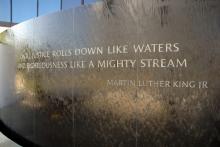
I was born in 1969 and thus am in the first generation of African-Americans to grow up with laws and policies that say to the rest of America that I am equal. I saw housing opportunities open up for me as my parents “broke the block” and became the first African-Americans to move onto an all-white block in the East Mt. Airy section of Philadelphia in 1970. I saw educational opportunities open up such that I was able to attend a nearly all-white private, college-prep high school in the suburbs. This was the fruit of the Civil Rights movement in my life growing up in the 1970s and 80s.
Soon hundreds of thousands will gather on the National Mall to commemorate the 50th anniversary of the March on Washington for Jobs and Freedom where the Rev. Dr. Martin Luther King gave his iconic “I Have a Dream” speech. That speech lived on for me in classrooms and in speech competitions and was etched on my heart so that I would carry that dream into the future.
The recent decisions by the U.S. Supreme Court to gut the enforcement section of the 1965 Voting Rights Act and the decision of the jury in the George Zimmerman trial have left me wondering about the dream, worried that it is under attack and worries that professed Christians are among those helping lead those attacks.
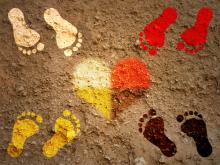
I was in my office on a quiet afternoon when I saw the car pull into the parking lot.
Those of us who work in churches are familiar with people stopping by seeking a bit of financial help. But people stop by churches for lots of reasons. It’s best to wait to see what they want before making assumptions.
As I watched the African-American gentlemen get out of his car, I sighed. My peaceful afternoon was going to be interrupted by yet another request for help. We could do that, but it would take some time. He came into the church and I greeted him.
“Hi, how are you?”
“Fine,” he said. “But I think I’m lost. I’ve got this appointment at a business near here, but I think I missed a turn. Can you help me figure out where it is?”
So why did I assume he was looking for a handout? The only variable was the color of his skin. And in that moment, I realized how quickly I make judgments about people based on stereotypes that lurk within me. And I was grateful that I had kept that stereotype to myself when I greeted the man.
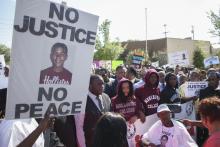
they will kill you
and say I’m sorry
and expect your mother to
forgive and forget
she ever gave birth to you
carried you in love for nine months
endured labor
and pushed you out with God’s might moving in her hips
ever fed you life from her bosom
or how you smelled like heaven after she washed you
that she ever watched you take your first steps
speak your first words
ever tucking you into bed with stories that rocked you to sleep
the many nights she prayed for your protection
or how excited she was the day you gave your first recital
that she ever taught you to be good and kind
ever beamed with pride
whenever you got an A on your test
that she ever wanted the best in this world for you
The battles over immigration reform and race have weighed heavily on me this summer. They have each become a symbol and a test, for me, of whether we can resurrect “the common good” in this nation.
I say that having just met with virtually all the key decision makers on when, how, and even if our nation’s politicians have the capacity to reform our terribly broken immigration system and help heal the nation from all the pain it has caused. Almost two-thirds of the country — both Democrat and Republican — is for reform, but this ideological impasse is now the greatest threat to our 11 million undocumented friends and neighbors in this country. I have met with both Republican and Democrat senators and members of Congress, including their leaders, the president and his leadership team, law enforcement officials, business leaders, and hundreds of pastors and Christians across denominations and backgrounds — all of whom want to repair this deeply flawed and cruel system.
There is so little substance to oppose reform. It’s good for the economy, for law enforcement, for families, communities, and congregations, and for the moral fabric of our nation — as a place of diversity, growth, and welcoming.
You see, politics really isn’t the problem here. Nobody wants to talk about what is at the very heart of the problem: race.
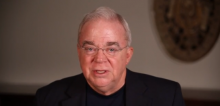
Jim Wallis sat down after the George Zimmerman verdict earlier this month to give his thoughts on race, faith, and truth.
"We live in our different worlds. That's not what we're supposed to do as the body of Christ."
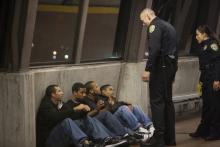
I tend to keep my heart under lock and key. I am not prone to Merton-esque revelations. My conscious mind is a far safer vantage point from which to view life’s experiences, so when a friend invited me to go see the newly released Fruitvale Station last night, I thought that was the perspective from which I would see it: my logical mind, my heart under wraps. It was about a subject with which I have no experience and only vaguely remembered from the papers a few years back. I thought it would be a perfect film for my head to be educated while my heart remained safe. I was wrong.
Fruitvale Station broke my heart open.

During a layover in the Phoenix airport on Friday, I caught the tail end of President Barack Obama’s remarks about the Trayvon Martin case. Struck by Obama’s words, I said to no one in particular, “It’s about time he said something about this.” The man next to me looked in my direction as I walked to get a snack, and I considered for a second going back and asking his impression of the president’s remarks. I kept walking toward the green licorice, but fate had other plans.
Who ended up being in seat 18B next to me? Yep. We smiled as we made eye contact, a mutual recognition that we had an overdue conversation coming and the time to have it.
For a living, I teach and facilitate dialogue. I train others how to — and why to — have challenging conversations that transform relationships and design community change. I have facilitated more than 10,000 hours of dialogue in the past 15 years.
I was feeling confident and curious. We got right into it.
“Well, looks like we are supposed to talk about it,” I said as he laughed. “What did you think of the president’s remarks?”
“I think I thought differently than you did,” John said

In light of the Zimmerman verdict, it’s taken my all to keep my spirit afloat. Upon the verdict’s announcement, I sat in shock and dismay, perplexed by the outcome. Despite anything revealed through the trail, a few facts remain: Martin, an unarmed teenager was followed and pursued by an armed adult, Zimmerman. Ultimately, Martin was fatally shot by Zimmerman, and Zimmerman’s received no legislative punishment for killing Martin.
Upon awakening from the trance of the verdict, I began crying as I held my four-month old son. I wept because as an African-American male, I’m fully cognizant of how dark brown skin will exacerbate his odds of being profiled and criminalized as Martin was. I am also aware that the neighborhood we reside in, by choice, on account of our faith, also increases his chances of being stereotyped. Nevertheless, irrespective of how stacked the odds are against someone, odds never define a person’s existence. Through God’s grace, communal support, social capital, hard work, and discipline my son can overcome these odds; but I must admit, my faith in this took a blow Saturday.